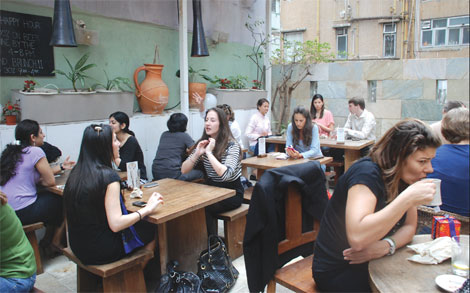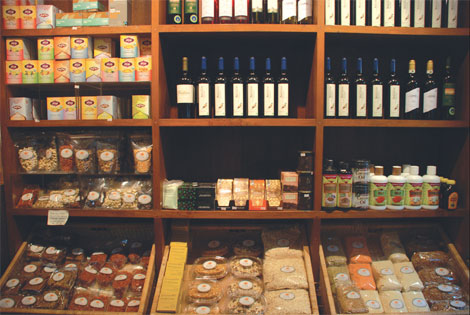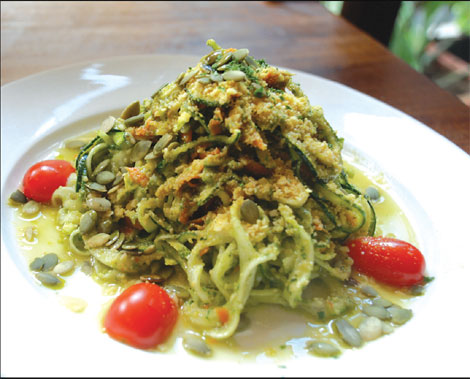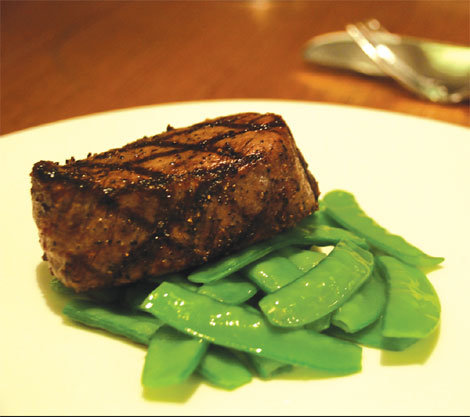Discovering the organic outlook on life
Updated: 2010-06-30 07:24
By Phoebe Cheng(HK Edition)
|
|||||||
|
Diners eat at a terrace in Life cafe. The eatery not only serves organic food but also provides a relaxed dining environment. Provided to China Daily |
|
Life sells packaged organic food and drinks. |
|
Raw Power Zucchini served in Life. |
|
180 gram Petit fillet served at Coast. |
They are a lot pricier than ordinary foods but the growing popularity of organic, natural produce demonstrates that more and more people in Hong Kong are prepared to pay extra to ensure quality, in the pursuit of better health. Phoebe Cheng reports.
The feel of the farm, of fresh vegetables and the open air, comes with the dinner and lunch servings at a simple cafe in Soho, in the center of the concrete city. Vegetarian organic food and a message of healthier living is served up here, amid the teak-wood-decor eatery.
Moosa's 100-seat eatery is fully reserved during lunch hour. The traffic in and out is non-stop. Moosa and his staff are kept busy running around the three-storey establishment, serving food and cleaning tables.
Moosa is firmly committed to the organic lifestyle. To him it's not only about eating healthy food. It's also a moral lifestyle that causes no harm to the natural environments of the body, the community and the planet as a whole. Moosa thinks everyone can benefit from eating organic food.
"A lot of internal health has been tied to whether your inside environment is acidic, or alkaline," Moosa explained. "If your inner environment, your system and your blood are more alkaline, you tend to have better health and less disease. And the difference between organic (food) and conventional (food) is that most conventional food converts to acid in your digestive system and most organic food is alkaline. So it lowers the overall acidity in your body when you eat organic food."
Organic food may not have any more vitamins and minerals than conventional food but it is the reduced use of chemicals and fertilizers during the growing process that makes the foods more wholesome, while at the same time causing less damage to the soil.
"With the use of chemicals and fertilizers in altering the products in that way (mass producing), it's not natural basically for a body to digest those chemical products so the body's reaction is to produce acid," Moosa said.
Having an organic burger as lunch at the bar table of Life, Martin, a partner at a firm of solicitors and notaries in Hong Kong, said he likes the consistent quality of the food at the cafe.
"I've found that the organic option is very limited in Hong Kong whereas in the UK and even Singapore and the US there would be more choices," Martin said.
Housewife Yvonne Lui, about 40, is another customer of Life. She does not mind buying organic food, although it is more expensive than conventional foods. She believes the quality of organic foods is superior.
"Organic food comes with certification; an assurance that means I am less concerned when I eat the food," Lui said. "And organic food is tastier which comes with a sharp taste. The original tastes of bitter and sweet of the vegetables come naturally."
Qualified organic food comes with provenance certification, showing where the vegetables are grown and when it is harvested. The certification is shown on the food packages. Moosa cautions consumers to be wary of some so-called organic vegetables which are perfect in shape and bright in color. Organically grown foods do not possess the perfect shape and color one sees in artificially grown products.
"They are all the same size, all the same red, all perfectly round. They look good but they are actually being forced into that shape," said David Kan, head chef of Coast, an eco-friendly restaurant in Hong Kong. "With organic vegetables, normally, they won't be as perfect as such. They would be left to grow naturally. You get a variant, not 'perfect perfect'," he added.
"That's the nature of organic. There is a slight difference but you can be sure the taste is there. There is a natural taste, not a chemical taste."
Kan added that it is important for chefs to know the sources of the ingredients they use and with the strict standards for organic farms, chefs are assured of the quality of foods. With the provenance cited on packages of organic meat, chefs can be informed as to where livestock was kept and when the animals were slaughtered. Kan took the 250-gram beef filet served in the restaurant as an example.
"This one should come from a 150-day-old animal which was fed on grain only," Kan said, pointing to the beef filet.
"Very often nowadays when you go to a restaurant, they might get some meat that is very cheap, but you don't know where the meat comes from. The meat may be spun on the floor or the animal may have been fed drugs or chemicals and a lot of bad things like that which would affect the quality of the meat so we have to make sure that we know where our meat comes from."
The concept of organic meat requires that animals be fed properly. Organic chicken and cattle should be fed with corn, wheat and the like, rather than feed made from other poultry and cattle, according to Kan.
The proof of organic meat also assures that the meat has not been injected with chemicals, especially for chicken meat.
"People put drugs in the chicken and make their breast grow big, quickly but unnaturally," Kan explained. "For organic, it has to be a natural process. They are kept in a field where they can walk around. They don't inject them with chemicals. The chicken was fed properly and was slaughtered in a humane way. The way it is killed and the way it was being raised would affect the quality of the meat. If it is organic, it would have more flavor."
At Moosa's place, there is a philosophy that simply eating organic food is not enough. The food needs to be cooked properly, diners should have a good appetite and be relaxed.
Less oil, no preservatives, a relaxed dining environment and a stress-free body are all elements for the best organic food, said Felix Au, the chief chef of Organic Life Cafe & Restaurant, an eatery in Kowloon Bay.
Au and his team put a great deal of effort into preparing foods. Dishes are served in a comfortable and relaxed atmosphere.
"After all, everything has to be balanced and most importantly, customers have to eat happily," Au said.
(HK Edition 06/30/2010 page4)



